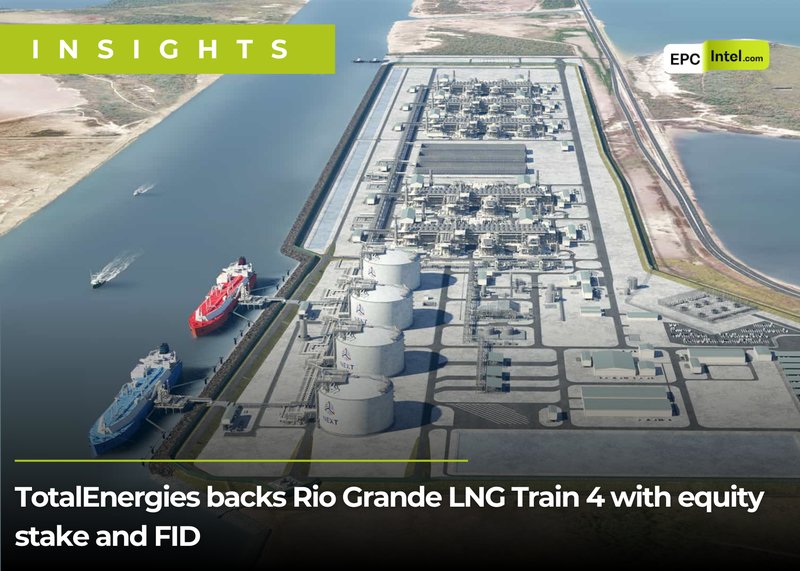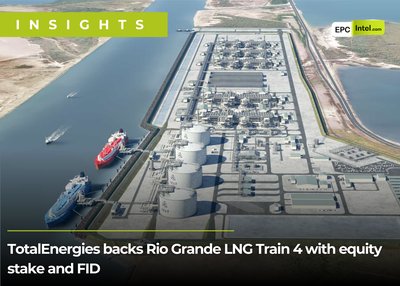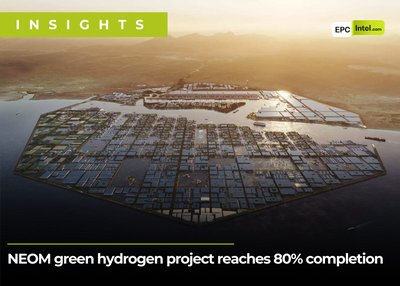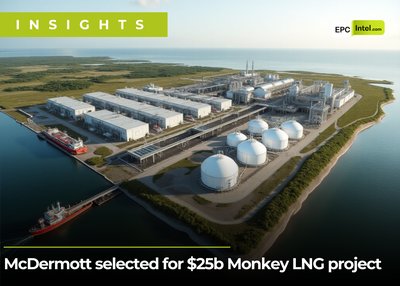TotalEnergies and its partners have sanctioned the long-awaited Train 4 expansion of the Rio Grande LNG project in South Texas, locking in new export capacity and additional EPC opportunities across the Gulf Coast.
The decision confirms construction of a fourth 6 million tons per annum (Mtpa) liquefaction unit at NextDecade’s Brownsville site, which will lift the facility’s total output to around 24 Mtpa by 2030. For TotalEnergies, the move adds 1.5 Mtpa of contracted offtake and deepens its equity alignment with NextDecade and the project consortium.
Partners and ownership
The final investment decision was taken jointly by NextDecade (40%), Global Infrastructure Partners (36.9%), GIC (7.9%), Mubadala (5.2%) and TotalEnergies, which now holds 10% directly in Train 4 and another 7% indirectly via its 17.1% stake in NextDecade.
This structure reflects a strategy where equity is split roughly 40% sponsor cash and 60% project finance debt, in line with recent Gulf Coast LNG precedents.
EPC and package outlook
Train 4 replicates the three-train design already under execution by Bechtel, which won the multi-billion-dollar EPC contract for Phase 1 in 2022. Bechtel is widely expected to extend its scope to cover Train 4, adding to an order book already comprising gas treatment units, liquefaction trains, storage tanks, utilities and the marine export terminal.
Typical capital distribution for a Gulf Coast LNG train, based on EPCIntel’s database, runs as follows:
-
Liquefaction process units: 35 to 40 percent of total EPC cost
-
Storage tanks and marine facilities: 20 to 25 percent
-
Power generation and utilities: 15 to 20 percent
-
Balance of plant and infrastructure: 15 percent
With Train 4 expected to cost in the region of USD 8 to 9 billion, EPC packages for process equipment alone could be worth USD 3 to 3.5 billion.
Cryogenic heat exchangers, compressors and pre-treatment modules will be sourced primarily from the United States, Europe and Japan, with suppliers such as Air Products, Baker Hughes and Siemens Energy positioned for key orders.
Storage and marine scope, including a full-sized LNG tank and jetty extension, will command another USD 1.5 to 2 billion. Tank fabricators and marine civil contractors are already competing for subcontracts under Bechtel’s umbrella.
Electrical systems, utilities and balance of plant make up the rest of the spend, with specialized subcontractors in transmission, control systems and water treatment among the likely beneficiaries.
Commercial alignment
TotalEnergies has already signed a 20-year sales and purchase agreement for 1.5 Mtpa from Train 4, complementing its 5.4 Mtpa offtake from Phase 1. In total, the French major’s U.S. LNG exposure will exceed 16 Mtpa by 2030, consolidating its position as one of the top three global players in liquefied natural gas.
NextDecade, meanwhile, cements TotalEnergies as both anchor customer and equity partner, a dual role that has been instrumental in securing bank financing and derisking the project.
Matt Schatzman, Chairman and CEO of NextDecade, highlighted the significance, saying: “LNG exported by TotalEnergies from our project will provide affordable, reliable, and secure energy to customers around the world.”
Timeline and execution
Phase 1 of Rio Grande LNG, comprising three trains with a combined capacity of 18 Mtpa, is under construction and targeted for start-up in 2027. Train 4 is scheduled to follow in 2030, extending the build out of one of the largest LNG complexes in North America.
Given the scale and financing already in place, early works on Train 4 are expected to integrate seamlessly into Bechtel’s ongoing site activities, minimizing mobilization costs and optimizing labor resources in a tight Gulf Coast construction market.
Strategic context
For TotalEnergies, the move reinforces its pivot toward gas, with the company targeting close to 50 percent natural gas in its portfolio by 2030. Global LNG volumes reached 40 Mtpa in 2024 across its portfolio, and Rio Grande is one of the flagship growth platforms.
For the supply chain, Train 4 ensures continuity of LNG megaproject spending in Texas into the next decade. With Bechtel at the helm, subcontractors in steel fabrication, cryogenic systems, marine civil works and electrical integration stand to secure multi-billion-dollar scopes.




